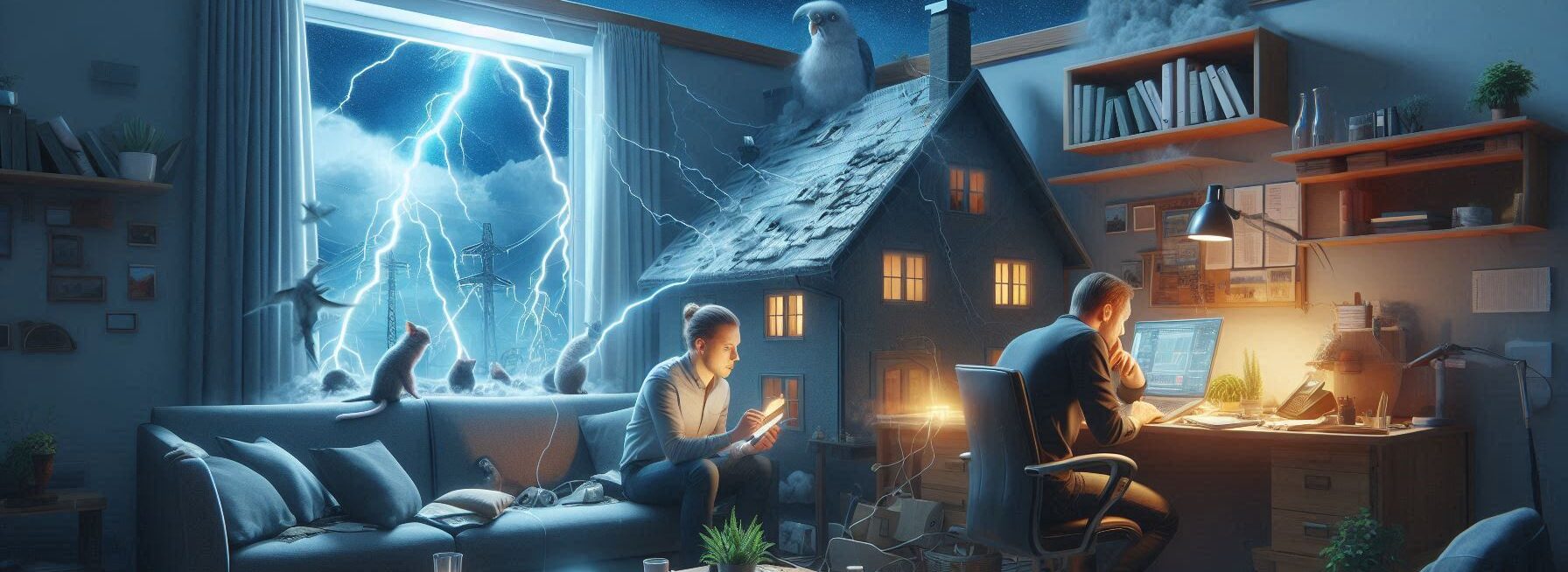Please Note: This post may contain affiliate links. If you click one of them, we may receive a commission at no extra cost to you. As an Amazon Associate, I earn from qualifying purchases.
Last Updated on November 2, 2025 by Kevin Collier

Top Takeaways and Key Concepts
- Limit news sources to a few trustworthy outlets to reduce overwhelm.
- Use alternative media like podcasts, blogs, and independent sites for diverse viewpoints.
- Verify information by checking credentials, cross-referencing sources, and assessing transparency.
- Follow reliable social media accounts and relevant hashtags for real-time crisis updates.
- Create family or community communication groups to share verified news quickly.
You know, staying informed today feels a bit like trying to drink from a fire hose. News is everywhere, and it's fast! When something big happens, like a natural disaster or, I don’t know, your neighbor's cat escaping, it’s easy to feel overwhelmed. It can really make your head spin.
It can be hard to find the correct information. There is a lot of noise out there. It's like being in a room full of people who are all chatting at the same time. Panic is setting in. But don't worry! You can keep it all together without throwing up.
Alternative media can be helpful. When the news gets too much, this thing can be your best friend. It's possible that it's a podcast you can listen to while you cook. Or a news site that isn't affiliated with any one group and cuts through the noise. These sites might provide you diverse points of view and help you understand things better.
It might make a great difference to find your favorite places to go. You don't have to read a lot of news to be up to date. Just a few good sources will do. It's better to have quality than quantity. Take a seat, get your favorite drink, and pick what's most important to you.
Taking breaks is huge too. It’s okay to step away. Go for a walk or hang out with your dog. Being outside, even for a few minutes, clears your head. It helps you recharge.
Building a little routine can be helpful. Maybe check the news once in the morning and once at night. Keeping it brief helps keep the stress down.
In a world where everything feels urgent, remember that you can take it slow. Staying informed doesn’t need to be a race. You’ve got this! Stay smart, stay aware, and balance it all with some time for yourself. You deserve a little peace amidst the chaos.
Understanding Alternative Media

*** Shop for Survival Gear - Tools - Kits ***
Survival Gear - Bags and Backpacks - Knives - Boots/Footwear - Communication
Outdoor Cooking - Gloves - Hydration - Dry Boxes - Water Filtration Systems
Tents - Sleeping Bags - First Aid Kits - Multi-Tools - Flashlights - Fire Starters
Navigation - Survival Food - Night Vision - Headlamps - Stun Guns - Binoculars
When I say “alternative media,” I don't mean that strange website your uncle keeps posting on Facebook that says aliens are in charge of our weather (though that would be interesting).
Instead, alternative media is any source of information that isn't a big newspaper or television network. Blogs, independent news sites, podcasts, and even YouTube channels operated by people who possibly know what they're talking about are all good examples.
1. Different Voices: One of the best things about alternative media is that it has a lot of different voices. Independent voices offer new points of view, unlike mainstream media, which typically sticks to the same old stories (we've all seen those).
You might hear someone in Nebraska talking about flooding in their area and someone in California talking about how to get ready for wildfires, each based on their individual experiences.
2. Less Filtered Information: Do you ever feel that the news you see on TV has been filtered through ten layers of red tape? You can gain more direct access to news as it happens with alternative media. This implies changes will come faster and there may be less bias, except for the bias against pineapple on pizza.
3. Community and interaction: A lot of alternative media sites encourage community interaction by letting readers and listeners comment and express their thoughts. It's like sitting around a campfire where everyone tells stories, except instead of marshmallows, you get smart comments!
Finding Trustworthy Sources

Now that we've spoken about why alternative media is worth looking into, let's move on to the next question: how do you identify trustworthy sources? We don't want to base our strategy for staying alive on a conspiracy theorist's site that says squirrels are out to get us.
1. Check Credentials: Just because someone has access to the internet doesn't imply they know everything! Look for writers or hosts who have worked in their professions before. A journalism degree isn't required, but it can help you avoid those who think “fact-checking” means rapidly Googling something before clicking publish.
2. Check Information Against Other Sources: If something seems strange (like when Aunt Edna says she spotted Bigfoot on her last camping trip), don't believe it right away. Check it against information from other sources. If a lot of trustworthy sources say the same thing or give the same analysis, it's likely that it's true.
3. Look for Openness: Trustworthy sources should be open about where they get their money and who they work with. If a site contains a lot of “sponsored content” but doesn't say who paid for it, get out of there! No one wants to read articles that look like real news but are really just there to promote things that no one asked for.
Using Social Media Wisely

It's interesting that social media can be both good and bad during a crisis, depending on how you utilize it.
1. Follow Reliable Accounts: Find trustworthy organizations or journalists on sites like Twitter or Instagram that cover disaster management or crisis reporting. They typically give updates in real time during emergencies, and they usually skip over the fluff that fills up most feeds (such videos of cats playing piano).
2. Hashtags Are Your Friends: In times of trouble, some hashtags will become popular based on where you are or what kind of event it is (#HurricanePrep, for example). Following these hashtags lets you just see the most important things right now by getting rid of anything that isn't connected.
3. Don't fall into echo chambers: We all have friends who love to share posts that make us question what's genuine, but don't give in to the impulse! Instead, talk to others with different points of view. This will give you a wider range of information instead of just confirming what you already believe, which isn't very helpful if you're trying to get ready for possible disasters!
Making Your Own Network of Information

Hmm… If we want to use alternative media well in times of crisis, why not do it ourselves?
1. Set up communication groups: Use apps like WhatsApp or Signal to make family chat groups where everyone can instantly communicate news without having to rely on outside sources—or Aunt Edna's crazy ideas about squirrels again!
2. Share Resources Regularly: Get into the practice of sharing useful links from trustworthy alternative media sites in your group conversations on a frequent basis. This way, everyone stays up to date without being bombarded with alerts from traditional news channels all the time.
3. Have informal meetings: Why not get together once a month for some casual talks? While you eat popcorn, talk about what you've learned from different sources. It won't seem as scary as dealing with emergencies on your own!
Keeping Your Cool in the Middle of Chaos
It's crucial to maintain calm during crises, but it's also necessary to stay informed. Panic doesn't usually get us anyplace nice (unless it's directly into cookie dough).
1. Use Mindfulness Techniques: When you start to feel anxious because of too much information, try adding breathing exercises to your daily routine. Trust me, a few deep breaths work miracles!
2. Limit Exposure When Necessary: Sometimes being away from screens completely helps you see things more clearly when things are crazy. Take pauses throughout the day till things calm down outside and inside yourself!
3. Focus on what you can control: You can't control everything that happens around you, but putting your energy into preparing yourself can make you more resilient when unexpected problems come along.
Frequently Asked Questions
How many news sources should I monitor during a crisis?
Limiting yourself to a few trusted sources helps prevent overwhelm and avoids confusion during fast-moving situations.
Why should I include alternative media in my information routine?
Alternative media like blogs, podcasts, and independent news sites can offer diverse viewpoints and quick updates outside mainstream filters.
How can I verify if information is reliable?
Check the creator’s background, look for transparency, and compare information with multiple credible sources before trusting it.
Is social media helpful during emergencies?
Yes, following reliable accounts and relevant hashtags can provide fast situational awareness and local crisis updates in real time.
How can I avoid misinformation and bias?
Use critical thinking, avoid echo chambers, and cross-reference new claims before sharing or acting on them.
Should I take breaks from crisis news?
Absolutely—periodic breaks help reduce anxiety and improve clarity so you can process information calmly.
How can families share urgent updates without confusion?
Set up group messaging channels so trusted information can be shared quickly and consistently among household members or neighbors.
Suggested Resources:
Alternative News Sources
https://www.alternativenews.com
Emergency Preparedness Tips
https://www.ready.gov/prepare
How To Evaluate News Sources
https://www.factcheck.org/2020/07/how-to-evaluate-news-sources/

Kevin Collier is a seasoned survivalist and expert in prepping and homesteading, contributing to WiseSurvive.com. With a deep-rooted passion for self-sufficiency and outdoor survival skills, Kevin shares practical advice, strategies, and resources to help individuals prepare for any challenge. His informative articles cover a range of topics, from essential survival techniques to sustainable living practices, empowering readers to thrive in any situation. Whether you're a novice or a seasoned prepper, Kevin's insights will inspire you to take charge of your readiness and build resilience for the future.




